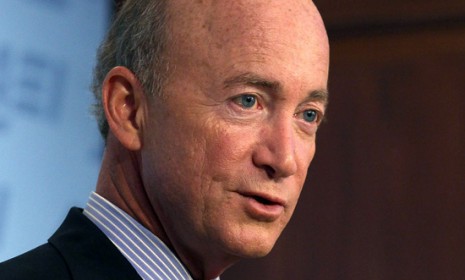Indiana's 'right to work' bill: A serious blow to Big Labor?
Indiana enacted the first "right-to-work" law in the nation's industrial North on Wednesday. What is this historic law and how much will it weaken unions?

A free daily email with the biggest news stories of the day – and the best features from TheWeek.com
You are now subscribed
Your newsletter sign-up was successful
On Wednesday, Indiana Gov. Mitch Daniels (R) signed the first "right-to-work" law in the traditionally union-heavy Rust Belt. A blow to organized labor, the law weakens unions by giving employees at unionized workplaces the option to skip out on paying dues. Unions turned out pretty heavily to oppose the bill, but a series of Republican victories in the state since 2006, and a change of heart by Daniels, paved the way to its passage. What are these laws, and what do they mean for organized labor? Here, a brief guide:
What is a "right-to-work" law?
Right-to-work laws, many of which were enacted in the South and West after World War II, bar mandatory union membership at businesses and prohibit unions from collecting dues from nonmembers. Joining 22 other right-to-work states, Indiana is the first to adopt the law since Oklahoma more than a decade ago. Indiana actually had a similar law on the books from 1957 to 1965, when it was repealed after Democrats took control of state government.
The Week
Escape your echo chamber. Get the facts behind the news, plus analysis from multiple perspectives.

Sign up for The Week's Free Newsletters
From our morning news briefing to a weekly Good News Newsletter, get the best of The Week delivered directly to your inbox.
From our morning news briefing to a weekly Good News Newsletter, get the best of The Week delivered directly to your inbox.
What are the arguments for, and against, such laws?
Daniels and other Indiana Republicans argue that the law will create a more business-friendly environment that will attract companies, and jobs, to the state. As well, says Jeff Jacoby in The Boston Globe, according to polls, "most Americans regard compulsory unionism as unconscionable." These laws aren't "anti-union." They promote choice. Opponents say these "right to work for less" laws erode wages, lead to lower-quality jobs, and unfairly let "free riders" enjoy union-negotiated benefits without paying for the negotiating. For what it's worth, says Andrew Rosenthal in The New York Times, "six of the 10 states with the highest unemployment have right-to-work laws."
Why is Indiana's such a big deal?
It's "a turning point in American labor history," says Abby Rapoport in The American Prospect. This is "the first time since 1957 that unions in a northern state have lost key rights," and the first right-to-work law aimed at crushing unions rather than preventing them from gaining power. Since the 1930s, the big question for organized labor has been "when will we organize the South," says Cornell University labor historian Jefferson Cowie. In Indiana, "the opposite happened. The South is slowly chipping away at the North and bringing the North into a lower wage, non-union economy."
A free daily email with the biggest news stories of the day – and the best features from TheWeek.com
Will other states follow suit?
Right-to-work activists in Michigan, Ohio, and Minnesota sound optimistic. But "the political factors that aligned in Indiana were so unique," says Tom LoBianco in the Associated Press, that a repeat in those states is "unlikely." Proponents in the dozen states that considered but failed to pass right-to-work laws last year have run into vetoes from Democratic governors, opposition from labor-friendly Republicans, or in other Rust Belt states, "squeamish Republicans who don't want to pick fights with private sector unions," which are weaker that they've been in 50 years but still "a clear political threat."
Will the Super Bowl in Indianapolis this weekend be affected?
Probably not. Daniels warned the unions on Monday that disrupting Super Bowl weekend would be a "colossal mistake," because "thousands of people are earning money they wouldn’t otherwise earn because of the Super Bowl." The unions apparently agree. The AFL-CIO says it will pass out pamphlets in the days leading up to the big game, but won't organize any big protests on Super Bowl Sunday. "This has always been about the fight over 'right to work,' and that takes place in the Statehouse and the ballot box," says AFL-CIO spokesman Jeff Harris.
Sources: American Prospect, AP, Boston Globe, Indianapolis Star, Los Angeles Times, New York Times, NPR, Think Progress, Washington Times